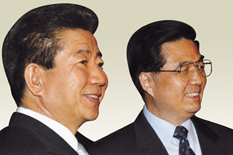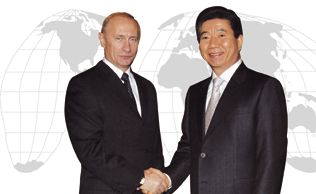Roh Stakes All in Resolving
NK Nuke Crisis
- Holds talks with global leaders over the North Korean issue in Moscow
 President Roh Moo-hyun is now staking all in efforts to resolve the ever deepening crisis over North Korea's attempts to develop nuclear weapons.
President Roh Moo-hyun is now staking all in efforts to resolve the ever deepening crisis over North Korea's attempts to develop nuclear weapons.
Roh is meeting with leaders from countries surrounding the Korean Peninsula and taking part in the stalled six-party negotiations aimed to persuade the North to rescind its nuclear ambition.
He met with Russian President Vladimir Putin and United Nations Secretary General Kofi Anan May 9 in bids to find a peaceful solution to the standing impasse over the North Korean nuclear issue.
Upon arriving in Moscow May 8 to attend the ceremony for 60th anniversary of the World War II victory, Roh held a summit talks with Chinese President Hu Jintao for discussion of the nuclear issues.
Roh is also scheduled to meet with Japanese Prime Minister Junichiro Koizumi in Korea in late June as part of shuttle diplomacy between the two nations and U.S. President George Bush before coming August.
Roh's brisk summit diplomacy comes amid growing international concerns over Pyongyang's nuclear ambitions in recent weeks. Intelligence reports confirmed last month the North has shut down its Yongbyon plutonium reactor, possibly to extract spent fuel that could be used to bolster its nuclear arsenal.
 The United States on Saturday warned it has a "robust deterrent capability" to deal with North Korea amid signs it may be preparing for a nuclear test.
The United States on Saturday warned it has a "robust deterrent capability" to deal with North Korea amid signs it may be preparing for a nuclear test.
Roh and Hu discussed ways to mediate an end to the dispute. South Korea and China have been opposing moves by hardliners in the U.S. administration to bring the North Korean nuclear issue to the United Nations Security Council, which they believe would exacerbate tensions.
During their summit, the two leaders also urged Japan to address its historical wrongdoings in a more sincere and apologetic manner. However, they did not release a joint statement on the outcome of the talks.
The summit has been drawing attention as it comes following a strong outcry in both South Korea and China regarding Japan's attempts to glorify its actions during World War II.
Roh's summit with Koizumi in late June will focus on issues of textbooks and Dokto islets in East Sea.
He called on Japan to act first in a bid to resolve the lingering historical misgivings during a meeting with a group of Japanese politicians in Seoul May 6.
The president attended the main ceremony of the war anniversary in Red Square May 9.
North Korea was also invited to the event but notified Russia it would not attend. Two ranking military officers will take part in the ceremony in the role of war veterans, not official representatives.
"On the occasion of the ceremony, President Roh attempted to highlight the nation's image as an initiator of peace and prosperity in Northeast Asia, despite being the last divided nation in the world," presidential secretary Chung said.
The visit is significant as it is the first time South Korea has been invited to the World War II victory celebration.
"Roh's participation will help expand the nation's diplomatic scope as a responsible member of the international community," Chung said.
Heads of state from about 50 countries around the world took part in the ceremony.
In the Asia-Pacific region, five nations were invited _ South and North Korea, China, Japan and India.
Russian President Vladimir Putin reportedly instructed South Korea be included on the invitation list although the nation was originally excluded from it.
"It shows Russia is putting emphasis on its relations with South Korea," a Chong Wa Dae official said. No nations from Africa or Latin America were invited.
Earlier, Putin stressed the importance of Moscow-Seoul relations when he met with Korean Ambassador to Russia Kim Jae-sup while receiving credentials from the envoy. "In the Asia-Pacific region, we are placing priority on promoting friendly relations with South Korea," Putin was quoted as saying.
He has also been supporting the Participatory Government's peace and prosperity policy toward North Korea while expressing objections to North Korea's bid to possess nuclear weapons.
North Korea was also invited but will not have official representation there. Presidential aide Chung declined to explain why North Korea would not send its representative, saying, "It is not proper for me to elaborate on the reason."
Roh visited Russia last September for summit talks with Putin on issues of mutual concern, including the lingering impasse over North Korea's nuclear weapons program.
Roh and Putin are scheduled to meet again on the sidelines of the Asia Pacific Economic Cooperation (APEC) session to be held in Busan in November.
Russia, together with China, has been regarded as an ally of the reclusive North Korea and has leverage in efforts to resolve the nuclear standoff.
The Seoul government has been calling on Russia to take a constructive role in finding a peaceful solution to the nuclear issue.
Roh renewed his request to China to play a similar role in persuading the North to return to the six-party talks to resolve the North Korean nuclear issue.
During a summit with Chinese President Hu Jintao, the two heads of state concurred on the need for closer cooperation to find a breakthrough to the deadlocked negotiation process.
Roh has been desperate to appeal for support from Russia and China to defuse the tension surrounding the Korean Peninsula, prompted by the move to bring the nuclear issue to the United Nations Security Council.
The Roh-Hu summit also dealt with the lingering controversy over Japan's distortion of history in recently approved textbooks and its territorial claim on the Dokto islets in the East Sea.
South Korea and China have been opposing Japan's move toward militarism and its glorification of the aggression and atrocities it committed during World War II.
Wrapping up his three-day visit to Russia, Roh flew to Uzbekistan May 10 for a summit with Uzbek President Islam Karimov on ways of strengthening ties in economic and security areas.
Roh focused on securing energy supply channels from the Central Asian nation as it possesses affluent reserves of mineral resources like crude oil, natural gas and gold.
Roh also presented plans to invite about 1,000 ethnic Koreans in Uzbekistan to South Korea as industrial trainees for the coming years. They are mostly descendents of Koreans who fled their homeland during the 1910-45 Japanese colonial rule of Korea. nw
3Fl, 292-47, Shindang 6-dong, Chung-gu, Seoul, Korea 100-456
Tel : 82-2-2235-6114 / Fax : 82-2-2235-0799